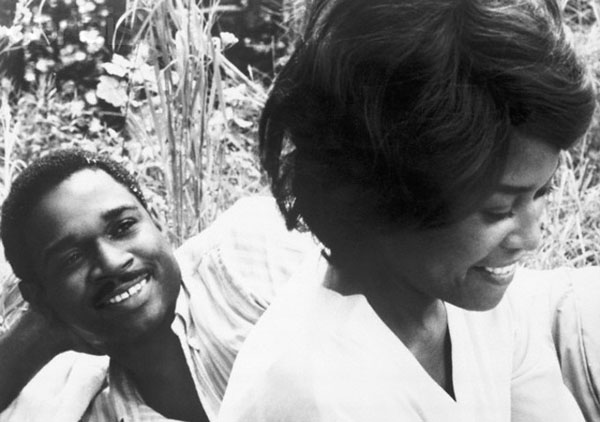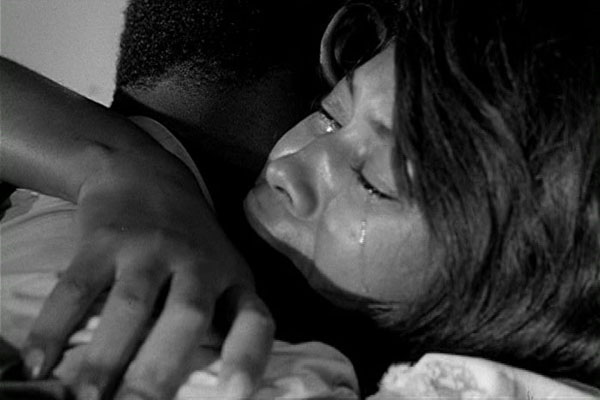The BFI is putting the Library of Congress restoration of Nothing But a Man (1964) in theaters in London and Edinburgh today; next week, it’ll play in Sheffield as well. When the new 35mm print screened at New York’s Film Forum last year, Nick Pinkerton noted in the Voice that the film “was shot in the summer of 1963—the summer of Medgar Evers, George Wallace at the University of Alabama, and ‘I Have a Dream’—set in the segregated South but filmed in the precincts of the South Jersey Shore. In his first fiction feature, Michael Roemer, a Berlin-born, Harvard-educated Jew, was looking to capture something essential about black life in small-town, contemporary Alabama. And despite the disjunctions in its inception, from the first black-and-white images by cinematographer/co-screenwriter Robert M. Young, process-oriented scenes of a black section crew putting down railroad track, Nothing but a Man has a commanding veracity that makes a viewer trust in its truth. Laurel-hung at Venice and lauded at the ’64 New York Film Festival, Nothing but a Man submerged from sight afterward but now resurfaces every decade or so in home video or revival… as if by historical necessity.”
The Brits agree. Five out of five stars from the Guardian‘s Peter Bradshaw (“has the boldness and simplicity of a real master”) and the Telegraph‘s Tim Robey: “Often cited as Malcolm X’s favorite film, the movie is about a railroad worker called Duff Anderson, sensationally played by Hogan’s Heroes star Ivan Dixon, who should have been catapulted by this performance into the kind of film career Morgan Freeman’s had. Duff starts to date a preacher’s daughter, played by the luminously beautiful jazz singer Abbey Lincoln, but their challenges building a life together are legion: not only does her father (Stanley Green) sternly disapprove, but Duff falls into an awful rut professionally, blacklisted from a local mill by its white owners after the merest suggestion that he and his co-workers should
‘stick together.'”
“The opprobrium he attracts from his chauvinistic colleagues and Josie’s unctuous father only accounts for a portion of the obstacles he must attempt to overcome,” adds Ashley Clark in Little White Lies. “Duff faces the ever-present, malignant cloud of white racism (both overt and implied); employment woes caused by his refusal to ‘play the nigger’ to white bosses; the spectre of his drunkard father (a brilliantly sour Julius Harris); and the inconvenient fact of his young, illegitimate son, whose mother has disappeared to the country’s north in search of a perceived utopia. It’s as though the past, present and future are converging on Duff at the same time.”
Back to the Stateside reviews, to Jaime N. Christley in Slant: “Almost without exception, movies about the minority experience in 1960s America were smoothed-over paeans to ‘the triumph of the human spirit,’ starring or co-starring whites whose presence is required as witnesses, arbiters, and the final, thankful beneficiaries of growth and change. Bland but well-meaning, movies like Guess Who’s Coming to Dinner? and A Patch of Blue, seeking to instruct the white moviegoer by giving them a diagrammatic path to sociopolitical enlightenment, had a funny habit of discounting, even nullifying, the black experience. It can’t be overstated just how Nothing But a Man is militantly tone-deaf to the Hollywood muzak of race relations.”
Nothing But a Man “is as convincing and emotionally agonizing as it was when I first saw it at the New York Film Festival in 1964,” wrote Amy Taubin for Artforum—and keep in mind, this was November 2012: “Formally, the film absorbed the Neorealism that had dominated European cinema, particularly in Italy, since World War II, and which continues to energize emerging national cinemas through what now is dubbed ‘observational cinema.’ The subject matter and point of view that made it seem ‘foreign’ when it was first released—especially in relation to social uplift movies about racial difference—still testifies to the ugliest aspect of America, the racism that was exposed by the civil rights movement and which has never been ‘cured,’ as the political discourse of the recent election proved.”
Update, 9/28: BFI programmer Geoff Andrew tells the story behind this extended run. Like many others, he’d never seen Nothing But a Man before, but once he did, he had to have it. Turns out, “Michael Roemer–now 85 and a professor at Yale–owned the rights himself…. In its themes, quiet tone and realist style, Nothing But a Man anticipated a great many later films of note, but I for one am not sure that it has ever been bettered. Its significance, surely, is timeless.”
Update, 10/3: Emma Brockes interviews Roemer for the Guardian.
For news and tips throughout the day every day, follow @KeyframeDaily on Twitter and/or the RSS feed. Get Keyframe Daily in your inbox by signing in at fandor.com/daily.





